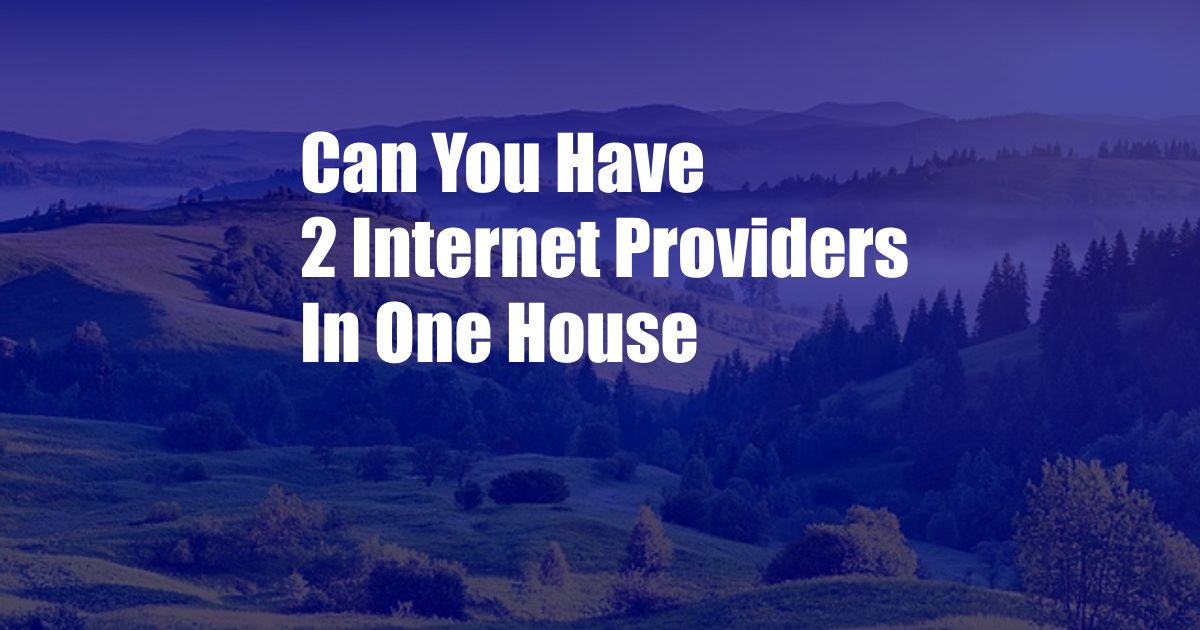
Can You Have 2 Internet Providers in One House?
In the era of digitalization, having reliable and fast internet connectivity is crucial. For households with multiple devices and individuals simultaneously using the internet, the question arises: can you have two internet providers in one house? The answer is a resounding yes! Having two internet providers offers several advantages, including increased bandwidth, redundancy, and the ability to choose the best service for specific needs.
The concept of having multiple internet providers in a single residence is known as multi-homing. With multi-homing, you can connect your home to two or more separate internet service providers (ISPs), such as cable, DSL, fiber, or satellite. Each ISP provides an independent connection to the internet, offering diverse paths for data transmission.
Why Have Two Internet Providers?
Increased Bandwidth
Having two internet providers allows you to combine their bandwidth, effectively increasing the overall speed and capacity of your internet connection. This is particularly beneficial for households with multiple users and heavy internet usage, such as streaming high-definition videos, online gaming, or downloading large files.
Redundancy
In the event that one internet connection experiences an outage or slowdown, having a second provider ensures uninterrupted internet access. This redundancy provides peace of mind, especially for businesses or individuals who rely heavily on a stable internet connection for work or communication.
Choice and Flexibility
With multiple internet providers, you have the flexibility to choose the best service for your specific needs. For example, one provider may offer lower latency for gaming, while another may provide faster download speeds for streaming. Additionally, multi-homing allows you to switch between providers if you encounter issues with one service.
How to Set Up Multiple Internet Providers
Setting up multiple internet providers in your home involves some technical considerations:
Separate Modems and Routers
Each internet provider requires a separate modem to connect to their network. Additionally, you will need a compatible router that supports multiple WAN connections. This router will act as a gateway, distributing the traffic between the different internet connections.
Load Balancing and Failover
To optimize your multi-homing setup, consider using a load balancer or failover device. A load balancer distributes traffic evenly across multiple internet connections, maximizing bandwidth utilization. A failover device automatically switches to a backup internet connection if the primary connection fails.
Expert Advice
Consulting with a professional network administrator or IT expert is recommended to ensure proper installation and configuration of your multi-homing setup. They can assess your specific needs, recommend compatible equipment, and assist with any technical challenges.
Common FAQs
Q: Is it expensive to have multiple internet providers?
A: The cost of having multiple internet providers will vary depending on the ISPs you choose and the speed and service plans you select. However, the increased bandwidth and redundancy may compensate for the additional cost.
Q: Can I use multiple Wi-Fi networks with different internet providers?
A: Yes, you can create separate Wi-Fi networks for each internet provider. This allows you to easily switch between networks depending on your requirements.
Conclusion
Having two internet providers in one house offers numerous benefits, including increased bandwidth, redundancy, and flexibility. By following the guidelines and expert advice provided in this article, you can effectively implement a multi-homing setup and enhance your internet connectivity experience. Would you like to know more about multi-homing and its potential applications?